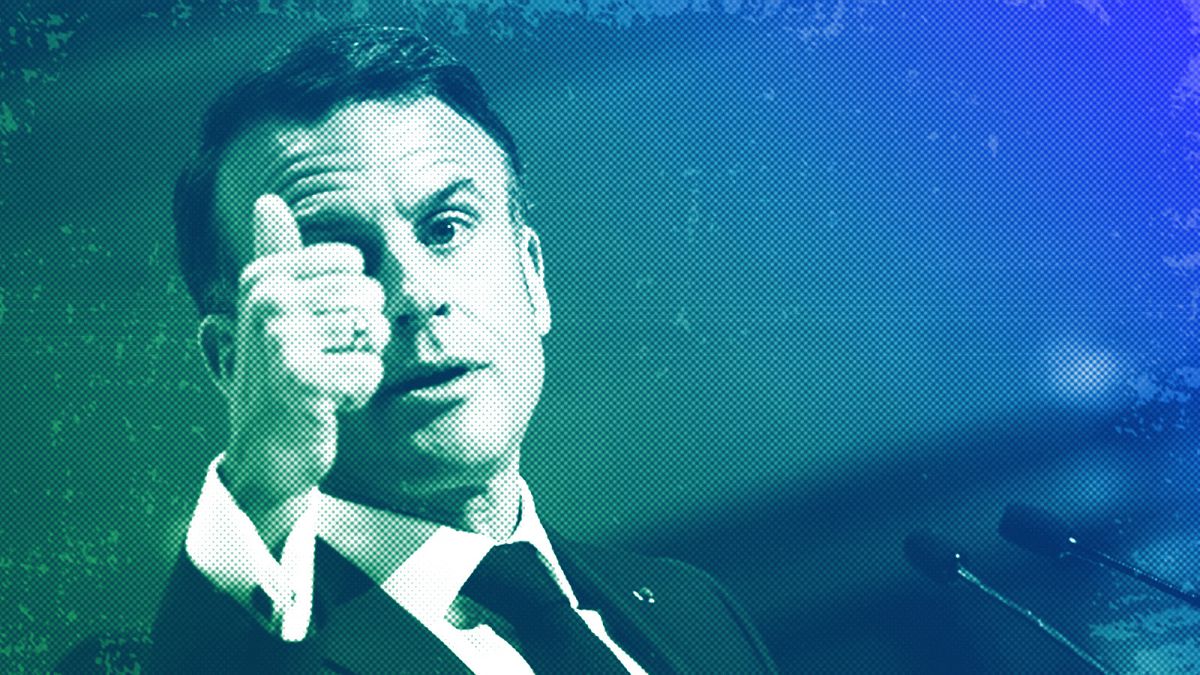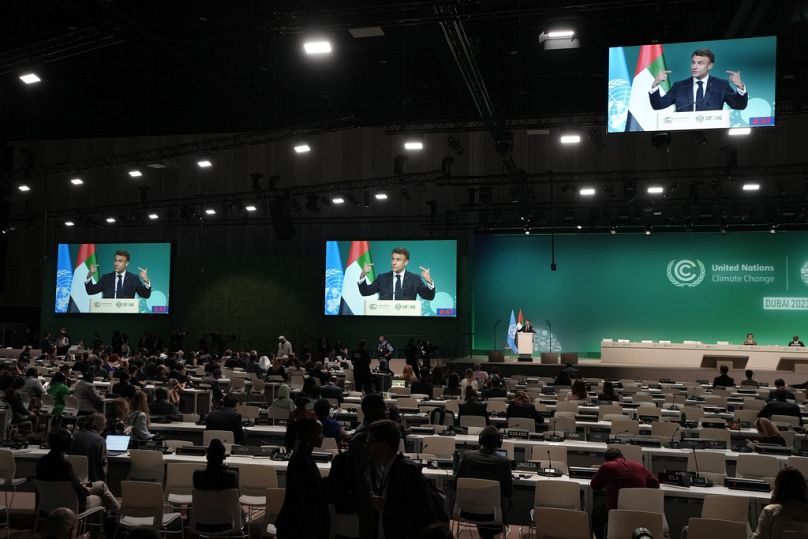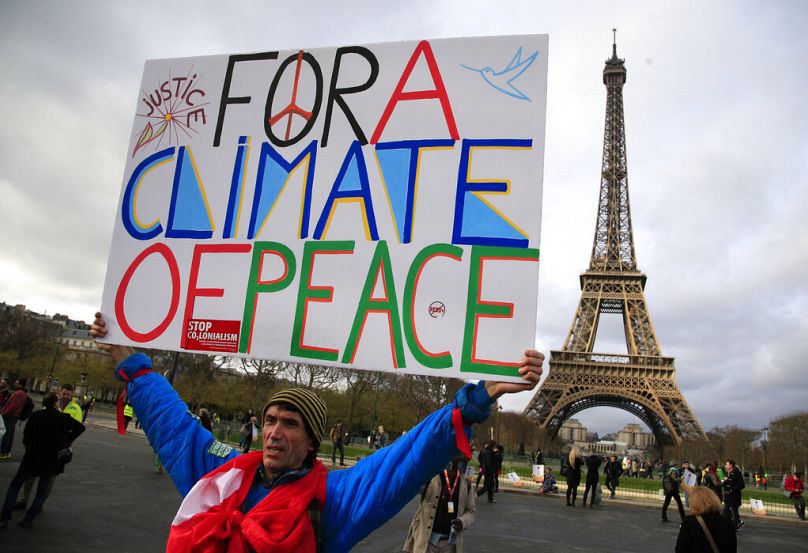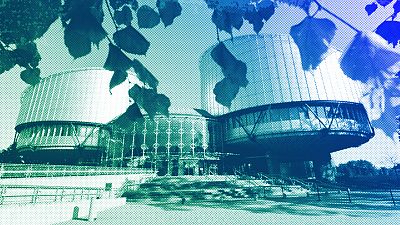By increasing investments in renewable energy and demonstrating strong leadership, France must strengthen its position as a world climate leader and inspire other countries to follow suit, Soraya Fettih and Andreas Sieber write.
As nations grapple with the monumental task of transitioning to renewable energy and building climate resilience, the need for equitable mechanisms to finance the transition has taken centre stage.
At the upcoming G7 climate ministerial, France has a unique opportunity to demonstrate leadership on the climate action front.
This year — dubbed the year for climate finance — France should lead the European bloc and fellow major economies with dollars and decisive action.
The pressure is mounting to replace the expiring $100 billion (€93.3bn) per year target set in Copenhagen in 2009 with a New Collective Quantified Goal. France, with its central role in various key initiatives, must seize this opportunity to spearhead innovative financing solutions.
France's actions are worth celebrating — but there's still room for improvement
President Emmanuel Macron has taken some steps away from the fossil fuel dependency that has characterised French policy in decades prior.
At the UN climate talks in 2021, France became a signatory to the Clean Energy Transition Partnership (CETP) — an agreement intended to accelerate the energy transition and propel the European Union to carbon neutrality by 2050. As a part of that agreement, Macron has delivered on withdrawing international public finance from fossil fuels.
Then in June last year, in Paris, Macron hosted the Summit for a New Global Financing Pact, where he proposed the "Paris Pact for People and the Planet" — a road map for reforming the international financial system, which has now been endorsed by over 40 states.
Later that year in Dubai, the annual UN climate talks reached a momentous agreement: a global renewable energy target calling for the tripling of renewable energy capacity and doubling of energy efficiency by 2030.
During the talks, France committed a €173-million contribution to various multilateral climate funds.
This past weekend at the G20, World Bank and IMF meetings, finance ministers of Brazil and France led discussions, later endorsed by the IMF, on implementing a wealth tax of at least 2% of billionaires’ wealth annually to raise funds to tackle climate change among other issues.
These are all actions worth celebrating. However, there are notable areas of hypocrisy and significant room for further improvement.
The to-do list that keeps growing
As well as divesting from fossil fuels, Macron must commit to actually redirecting public money into renewable energy development in the Global South, before the COP29 Summit later this year.
France must uphold its international commitments without using them as a convenient replacement for fulfilling its domestic responsibilities, only to later disregard and forsake them, as it has regrettably done in the past.
On the domestic energy front, France is not on track to meet its renewable targets as part of the EU's Renewable Energy Directive adopted in March last year.
As part of the agreement, the EU must collectively achieve a 42.5% share of renewable energy in its gross energy consumption by 2030, with France achieving a share of 44% domestically.
French Finance Minister Bruno Le Maire has as recently as last month referred to the goal as "too restrictive". As a result of these shortfalls, the government has been condemned for climate inaction by its highest administrative court.
With a recent national budget cut of €2.5bn for climate action, it is time France stops playing a double game, and aligns with its commitments both at national and international levels.
Later this month, Patrick Pouyanné, CEO of French oil conglomerate TotalEnergies, will be heard at the Senate in the context of the Commission of Enquiry on Total and their links with the state.
This investigation emerges amidst the growing visibility of France's fossil fuel diplomacy. Médiapart reported in March 2024 that one out of every three French embassies is relaying communications from oil and gas companies, as per their calculations.
Such state support raises concerns regarding the alignment of French diplomatic doctrine with the nation's climate commitments.
An illustrative instance is the recent granting of new LNG gas concessions to TotalEnergies, particularly in Papua New Guinea, where TotalEnergies employees were included in the French delegation visiting the country.
Enough token gestures, we need concrete action
France is well positioned to prioritise funding for renewables through initiatives like the CETP by redirecting public funds away from fossil fuels and towards renewable energy solutions.
By doing so, it can help level the playing field for countries disproportionately affected by the climate crisis and encourage European member states and the largest global economies to follow its example.
True leadership requires more than just token gestures; it demands concrete action. As a prominent member of the international community, France plays a crucial role in global climate action. France is at the moment playing a double game:
Issues such as financing the transition and holding polluters accountable are recurrently discussed on the international and regional stages, only to be conveniently brushed aside and forgotten.
Moreover, the French government often seeks to leverage its international commitments to further its own agenda, as seen in the case of LNG projects, for instance.
This duplicity must cease, paving the way for decisive and immediate steps to finance the global transition and uphold genuine adherence to international commitments. This entails reallocating funds from fossil fuels to green energy sources like wind turbines and solar panels.
Actions, investments, and policies reverberate beyond borders, influencing other nations and shaping the global response to the climate crisis.
By increasing investments in renewable energy and demonstrating strong leadership — through advocating a wealth tax, debt relief, global finance system restructuring towards justice, and leaving fossil fuels behind — France must strengthen its position as a world climate leader and inspire other countries to follow suit.
Soraya Fettih is French Campaigner, and Andreas Sieber is Associate Director for Global Policy and Campaigns at 350.org.
Contact us at view@euronews.com to send pitches or submissions and be part of the conversation.





